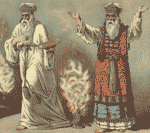Papias, a Christian bishop of Hierapolis, Phrygia in Asia Minor about the year 130, collected and analysed the “sayings and deeds of the Lord”, and yet he was unfamiliar with the gospels. He also appears to have been unaware of St Paul’s Epistles even though he lived a few miles from Colossae.
Eusebius damns this inconvenient witness to Christianity’s inventiveness by calling him “a man of exceedingly small intelligence.” (Eusebius, Hist. Eccl. 3.39.13).
Holy Speaking Grape Vine!
“Again Moses maketh a type of Jesus, how that He must suffer, and that He Himself whom they shall think toWe learn from Irenaeus (v.33) that Papias, in his 4th book, on the authority of ‘the Elder’ John, told how: have destroyed shall make alive in an emblem when Israel was falling. For the Lord caused all manner of serpents to bite them, and they died (forasmuch as the transgression was wrought in Eve through the serpent), that He might convince them that by reason of their transgression they should be delivered over to the affliction of death.”
“Our Lord had said that the days will come when there shall be vines having 10,000 stems, and on each stem 10,000 branches, and on each branch 10,000 shoots, and on each shoot 10,000 clusters, and in each cluster 10,000 grapes, and each grape when pressed shall give 25 measures of wine.
And when any of the saints shall take hold of a cluster, another shall cry out, I am a better cluster, take me, and bless the Lord through me.”
A dull echo of this fantastic nonsense appears in John 15:2
“Every branch in me that beareth not fruit he taketh away: and every branch that beareth fruit, he purgeth it, that it may bring forth more fruit.”
Papias also has a story (Eusebius, III. 39) about Justus Barsabas taking poison without injury. This fable shows up in the ‘extended’ edition of Mark as a generalized, albeit ridiculous, apostolic immunity from poison:
“They shall take up serpents; and if they drink any deadly thing, it shall not hurt them; they shall lay hands on the sick, and they shall recover.”
The literature of the world is filled with invented characters. With good reason it is called fiction. Jesus did not produce the Church. The Church produced its own self-serving fiction: the story of Jesus. In the early decades of the 2nd century, that is within less than a hundred years of the supposed life and death of a human saviour, the Christians that we know of were propagating the cause of a wholly spiritual Christ. If this Christ were accorded a life at all, it was in mythic “ancient times.”
In the two centuries that followed, a number of individuals contributed to the process of anthropomorphizing their celestial hero into the flesh and blood miracle-worker known to all. “Jesus of Nazareth” never lived but his life was invented to underpin adoration of the ineffable cosmic Christ and obedience to his worldly taskmaster, Holy Mother Church.
That Christ would also grow, in step with the authority and majesty of the Church, from an ’emanation’ or messenger of God into an eternal, co-creator of the universe. But it was not the aeons of ethereal eternity that would be turned into a pageant for the lost and gullible. In the scattered communities, ghettoes, and slums of the Roman Empire it was an ancient tale of sacrifice and re-birth that would be dressed up in new Christian clothes.
What DID the Early Christians Believe?











